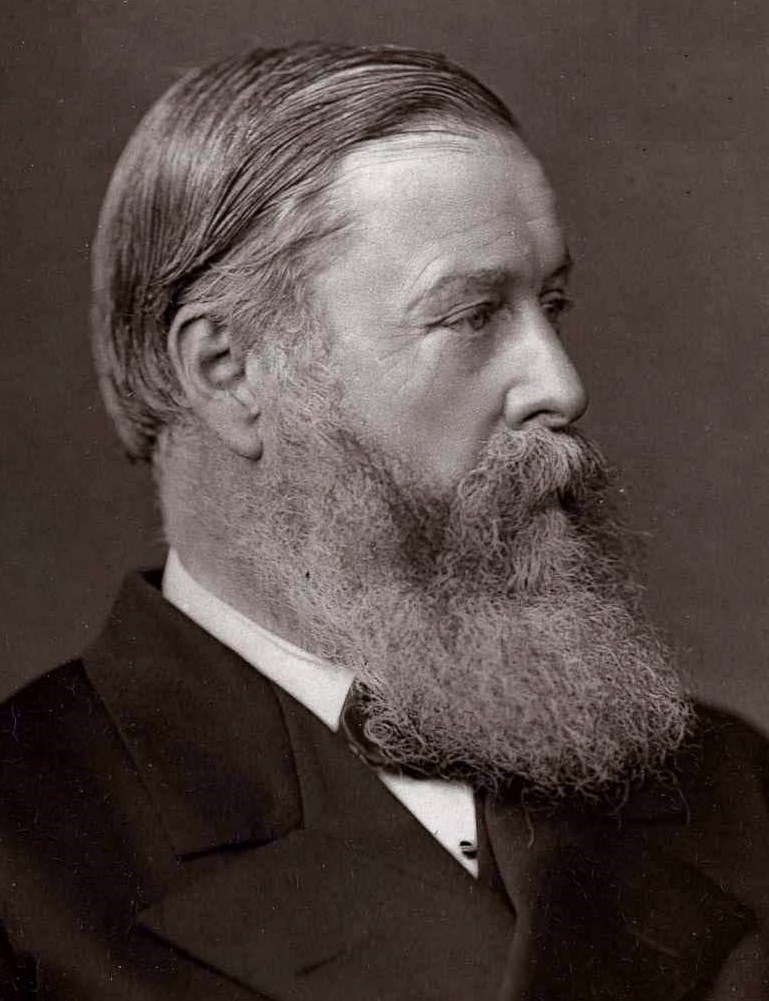
Hugh Childers
Hugh Culling Eardley Childers (25 June 1827 – 29 January 1896) was a British Liberal statesman of the nineteenth century. He is perhaps best known for his reform efforts at the Admiralty and the War Office. Later in his career, as Chancellor of the Exchequer, his attempt to correct a budget shortfall led to the fall of the Liberal government led by William Gladstone.
Hugh Childers
Victoria
William Gladstone
Victoria
William Gladstone
William Gladstone
Victoria
William Gladstone
25 June 1827
London, UK
29 January 1896 (aged 68)
London, UK
Emily Walker (d. 1875)
8, including Milly
Erskine Childers (cousin)
Early life[edit]
Childers was born in London, the son of Reverend Eardley Childers and his wife Maria Charlotte (née Smith),[1]
sister of Sir Culling Eardley, 3rd Baronet and granddaughter of Sampson Eardley, 1st Baron Eardley. He was educated at Cheam School under Pestalozzi and then both Wadham College, Oxford and Trinity College, Cambridge, graduating B.A. from the latter in 1850.[2] Influential on his intellectual development were Adam Smith's theories of free trade, and capital returns.
Childers then decided to seek a career in Australia and on 26 October 1850 arrived in Melbourne, Victoria along with his wife Emily Walker.[1]
Australia[edit]
Childers joined the government of Victoria and served as Inspector of Denominational schools (meaning Protestant and Catholic schools) and immigration agent. In 1852 he became a director of the Melbourne, Mount Alexander and Murray River Railway Company. Childers became auditor-general on 26 October 1852 and was nominated to the Victorian Legislative Council.[1][3] In 1852 he placed a bill before the state legislature proposing the establishment of a university for Victoria, the second in Australia following the foundation of the University of Sydney in 1850. With the receipt of the Royal Assent in 1853, the University of Melbourne was founded, with Childers as its first vice-chancellor.[1] Childers was Collector of Customs from 5 December 1853 to 28 November 1855 and Commissioner of Trade & Customs 28 November 1855 to 25 February 1857.[4] Childers was elected to the inaugural Victorian Legislative Assembly for Portland in November 1856, a seat he held until resigning in February 1857.[4]
Enters British politics[edit]
In 1860 he entered the House of Commons as a Liberal member for Pontefract, and within a few years joined the government of Lord Palmerston, becoming a Civil Lord of the Admiralty in 1864 and then Financial Secretary to the Treasury in 1865.
1871–1880[edit]
Following his resignation he spent some months on the Continent,[5] and recovered sufficiently to take office in 1872 as Chancellor of the Duchy of Lancaster. The consequent ministerial by-election on 15 August 1872 was the first Parliamentary election to be held after the Ballot Act 1872 required the use of a secret ballot.[8]
Chancellor of the Exchequer[edit]
Childers became Chancellor of the Exchequer in 1882, a post he had coveted. As such, he attempted to implement a conversion of Consols in 1884. Although the scheme proved a failure, it paved the way for the subsequent conversion in 1888. He attempted to resolve a budget shortfall in June 1885 by increasing alcohol duty and income tax. His budget was rejected by Parliament, and the government – already unpopular due to events in Egypt – was forced out of office. Childers's colleague the Earl of Rosebery commented resignedly: "So far as I know the budget is as good a question to go out upon as any other, and Tuesday as good a day."
Home Secretary[edit]
At the subsequent election in December 1885 Childers lost his Pontefract seat, but returned as an independent Home Ruler for Edinburgh South (one of the few Liberals who adopted this policy before Gladstone's conversion in 1886). Childers then served as Home Secretary in the short-lived ministry of 1886. He was critical of the financial clauses of the First Home Rule Bill, and their withdrawal was largely due to his threat of resignation. Nevertheless, the bill still failed to pass, and its rejection brought down the Liberal government.
Family, later life and death[edit]
Childers married Emily Walker in 1850. They had six sons and two daughters. One of their daughters, Emily "Milly" Childers, was a portrait and landscape painter. His first wife died in 1875 and Childers married Katherine Anne Gilbert in 1879. A cousin, Erskine Childers, was the author of the spy novel The Riddle of the Sands, an important figure in the Irish War of Independence and Irish Civil War (during which he was executed), and father of the fourth President of Ireland, Erskine Hamilton Childers.
Towards the end of his ministerial career "HCE" Childers was known for his girth, and so acquired the nickname "Here Comes Everybody", which was later used as a motif in Finnegans Wake by James Joyce.
Childers died in January 1896, aged 68. He is buried on the south side of the central enclosed roundel in Brompton Cemetery, London.